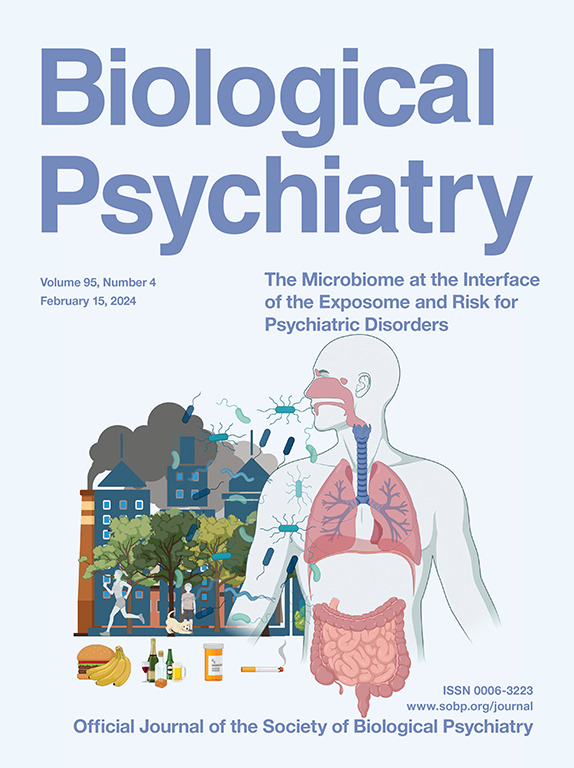Integrating Knowledge: The Power of Ontologies in Psychiatric Research and Clinical Informatics
IF 9
1区 医学
Q1 NEUROSCIENCES
引用次数: 0
Abstract
Ontologies are structured frameworks for representing knowledge by systematically defining concepts, categories, and their relationships. While widely adopted in biomedicine, ontologies remain largely absent in mental health research and clinical care, where the field continues to rely heavily on existing classification systems (e.g., the DSM). Although useful for clinical communication and administrative purposes, they lack the semantic structure, computational properties, and reasoning properties needed to integrate diverse data sources or support artificial intelligence–enabled analysis. This reliance on classification systems limits efforts to analyze and interpret complex, heterogeneous psychiatric data. In mood disorders, particularly bipolar disorder, the lack of formalized semantic models contributes to diagnostic inconsistencies, fragmented data structures, and barriers to precision medicine. By contrast, ontologies provide a standardized, machine-readable foundation for linking multimodal data sources, such as electronic health records, genetic and neuroimaging data, and social determinants of health, while enabling secure, deidentified computation. In this review, we survey the current landscape of mental health ontologies and highlight the Human Phenotype Ontology (HPO) as a promising framework for bridging psychiatric and medical phenotypes. We describe ongoing efforts to enhance the HPO through curated psychiatric terms, refined definitions, and structured mappings of observed phenomena. The Global Bipolar Cohort (GBC), an international collaboration, exemplifies this approach through the development of a consensus-driven ontology tailored to bipolar disorder. By supporting semantic interoperability, reproducible research, and individualized care, ontology-based approaches provide essential infrastructure for overcoming the limitations of classification systems and advancing data-driven precision psychiatry.
整合知识:本体论在精神病学研究和临床信息学中的力量。
本体是通过系统地定义概念、类别及其关系来表示知识的结构化框架。虽然在生物医学中被广泛采用,但本体在精神卫生研究和临床护理中仍然很大程度上缺席,该领域仍然严重依赖现有的分类系统(DSM)。尽管它们对临床交流和管理目的有用,但它们缺乏整合不同数据源或支持人工智能(AI)支持分析所需的语义结构、计算和推理属性。这种对分类系统的依赖限制了分析和解释复杂、异质精神病学数据的努力。在情绪障碍,特别是双相情感障碍中,缺乏形式化的语义模型会导致诊断不一致、数据结构碎片化和精准医疗障碍。相比之下,本体为链接多模式数据源(如电子健康记录(EHRs)、遗传和神经成像数据以及健康的社会决定因素)提供了标准化的、机器可读的基础,同时实现了安全的、去识别的计算。这篇综述调查了心理健康本体的现状,并强调了人类表型本体(HPO)作为一个有前途的框架,以弥合精神病学和医学表型。我们描述正在进行的努力,以提高HPO通过策划精神病学术语,精炼的定义,和观察到的现象的结构化映射。全球双相队列(GBC)是一项国际合作,通过开发针对双相情感障碍的共识驱动的本体,体现了这种方法。通过支持语义互操作性、可重复研究和个性化护理,基于本体的方法为克服分类系统的局限性和推进数据驱动的精确精神病学提供了必要的基础设施。
本文章由计算机程序翻译,如有差异,请以英文原文为准。
求助全文
约1分钟内获得全文
求助全文
来源期刊

Biological Psychiatry
医学-精神病学
CiteScore
18.80
自引率
2.80%
发文量
1398
审稿时长
33 days
期刊介绍:
Biological Psychiatry is an official journal of the Society of Biological Psychiatry and was established in 1969. It is the first journal in the Biological Psychiatry family, which also includes Biological Psychiatry: Cognitive Neuroscience and Neuroimaging and Biological Psychiatry: Global Open Science. The Society's main goal is to promote excellence in scientific research and education in the fields related to the nature, causes, mechanisms, and treatments of disorders pertaining to thought, emotion, and behavior. To fulfill this mission, Biological Psychiatry publishes peer-reviewed, rapid-publication articles that present new findings from original basic, translational, and clinical mechanistic research, ultimately advancing our understanding of psychiatric disorders and their treatment. The journal also encourages the submission of reviews and commentaries on current research and topics of interest.
 求助内容:
求助内容: 应助结果提醒方式:
应助结果提醒方式:


